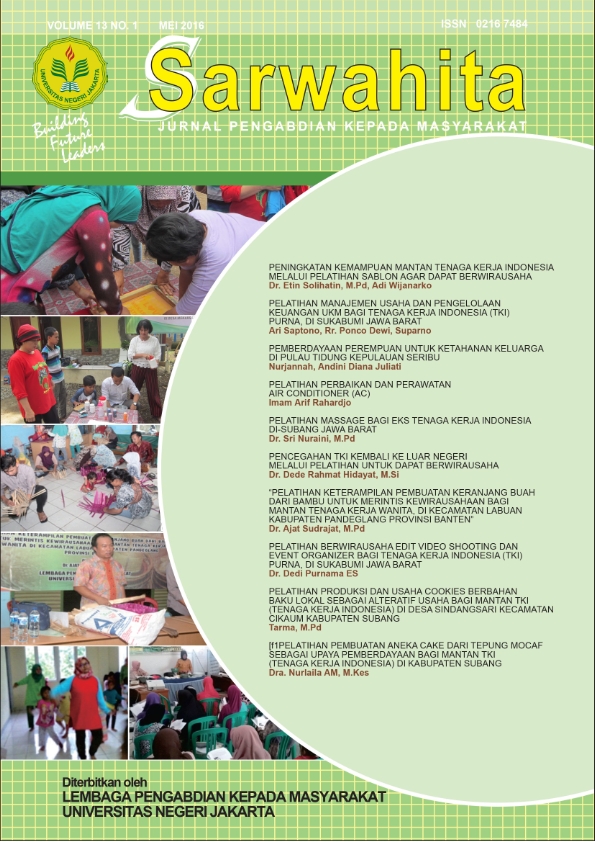PENCEGAHAN TKI KEMBALI KE LUAR NEGERI MELALUI PELATIHAN UNTUK DAPAT BERWIRAUSAHA
DOI:
https://doi.org/10.21009/sarwahita.131.06Abstract
Indonesia is one of the largest suppliers of informal labor in developed countries in ASEAN, Hongkong, Korea, Japan and Middle East Countries. Unlike the formal workforce that has good protection and income certainty. Workers in the non-formal sector still have vulnerabilities to get problems so there are efforts to reduce and prevent more Indonesians from becoming workers in the informal sector. One strategy is to increase the potential of migrant workers not to go abroad and to prevent ex-migrant workers from returning abroad.
How to prevent good is to train the former migrant workers by sharing skills so that they can develop their business independently. The training developed is to train entrepreneurial character and practice business skills. Community service is expected to help the program. Community service activities for former migrant workers are conducted in the form of entrepreneurship training. In this activity the participants are former TKI in Sukabumi which amounted to 20 people, conducted in Cibolang Village Gunung Guruh District.
Downloads
Published
Issue
Section
License
Copyright Notice
Penulis yang naskahnya diterbitkan menyetujui ketentuan sebagai berikut:
- Hak publikasi atas semua materi naskah jurnal yang diterbitkan/dipublikasikan dalam situs E-Journal Sarwahita : Jurnal Ilmiah Pengabdian kepada Masyarakat ini dipegang oleh dewan redaksi dengan sepengetahuan penulis (hak moral tetap milik penulis naskah).
- Ketentuan legal formal untuk akses artikel digital jurnal elektronik ini tunduk pada ketentuan lisensi Creative Commons Attribution-ShareAlike (CC BY-SA), yang berarti Sarwahita : Jurnal Pengabdian kepada Masyarakat berhak menyimpan, mengalih media/format-kan, mengelola dalam bentuk pangkalan data (database), merawat, dan mempublikasikan artikel tanpa meminta izin dari Penulis selama tetap mencantumkan nama Penulis sebagai pemilik Hak Cipta.
- Naskah yang diterbitkan/dipublikasikan secara cetak dan elektronik bersifat open access untuk tujuan pendidikan, penelitian, dan perpustakaan. Selain tujuan tersebut, dewan redaksi tidak bertanggung jawab atas pelanggaran terhadap hukum hak cipta.









